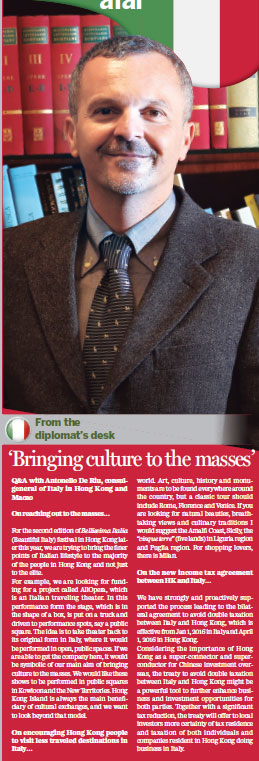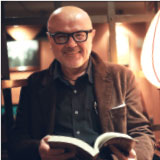Mediterranean medley
Updated: 2016-06-02 06:41
By Chitralekha Basu(HK Edition)
|
|||||||
As Italy celebrates its National Day, we bring you the stories of three Italians who have introduced both food and food for thought harvested from the Italian soil to HK. Chitralekha Basu reports.
Since April 1, 2016, Hong Kong has begun a new chapter of enhanced trade ties with Italy. Officially struck off Italy's black list of economies, Hong Kong is now looking forward to receiving entrepreneurs, investors and tradesmen from the country known the world over for the style sense of its people. The stage is set for a cloudburst of Italian brands, be it food, fashion, or fine wines.
Guido Forni, CEO of ItalMenu, is one of the early birds to arrive on the scene. After nearly two years of groundwork here in Hong Kong, his company is all set to launch an exhaustive range of pasta, pizza and pesto sauce in the city's hypermarkets next month. Most of the products are from Coop Italia, a very visible food store chain in Italy. Ferrero (as in Ferrero Roche chocolates), Ferrara and The Coop Fiorfiore are among the much-sought-after brands in Italy to have already registered an online presence in the Chinese mainland.

From their Arbuthnot Road office in Mid-levels, Forni and his team are trying to spread the aroma and flavors of Italy across Asia. "We already have opened offices in Hong Kong, Shanghai, Taipei, and plan to do so in Singapore, Bangkok and Hanoi in another year," says Forni. "Hong Kong is our base because it's probably the most Western city in Asia. The facilities are good. It's also the gateway to the mainland, which is the biggest market in Asia, and to us it's the most important one," he adds.
They were on a learning curve in the mainland, having to explain the nitty-gritty of Italian cooking to first-time buyers of their products. Forni remembers receiving complaints from frustrated customers, unable to figure why the pasta remained uncooked even after hot water was poured on it. "So you need to offer some elementary education (in the form of online cooking classes), probably not in Hong Kong or Shanghai, but if we want to spread our products all over Asia we will have to do that," says Forni.
The range, 99.5 percent of which is produced on Italian soil, conforms to the highest European standards of food safety norms, informs Forni. "All our products contain no preservatives, no artificial coloring, no GM food and no trans fats," he says. For those keen to reduce their carbon footprints there is an organic line as well, and another for people with special preferences. The latter range comprises products free of gluten, lactose or containing extra vitamins. "The line was launched in Italy to help people prone to allergies. These are expensive products one can buy in pharmacies, but we offer a competitive price," says Forni.
ItalMenu is also introducing a line of artisan products, developed following traditional Italian recipes. "Before these were sold only in delicatessen shops, our goal is to take them to the mass market," says Forni.
Under the Tuscan sun
In his 11 years in Hong Kong, Paolo Fassina has gone from being a restaurant manager to a wine marketeer whose business model is taught in B-schools. He had arrived in Hong Kong, hoping to introduce the idea of wine consumption as a cultural experience, at a time when there weren't that many wine professionals in the city. "My goal was to promote wine tourism," says Fassina. The potential was immense. "We have wineries in the most iconic locations of Italy - Tuscany, Piedmont, Sicily."
Between 2008 and 2015 the value of imported Italian wine in Hong Kong rose from 11 million to 27 million euros ($12.3 million to $30.2 million). It helped that in 2008 the Hong Kong government removed taxes on wine import. Fassina played a role in this growth story in his various avatars as an ambassador for fine Italian wines, first as restaurant manager with the now-extinct Cinecitta, then as wine director for the Elite Concepts chain and finally as Asia manager of the much cherished brand Banfi whose products originate from a vineyard estate located in Brunello, Tuscany. Be it universities, exclusive clubs, food and beverage fairs or the Italian Chamber of Commerce in Hong Kong, Fassina is, unequivocally, the first choice when it comes to a dose of wine punditry.
Nothing gives him a greater kick than getting to disseminate his knowledge about a subject he has been pursuing since age 19. "Fine wine is like classical music, understood only by those who have gone through the orientation process. Getting to share this knowledge with people is the most important marketing tool," says Fassina.
He arrived in Hong Kong at the right time, to take advantage of a growing market, which has nearly tripled over seven years. Then it hasn't exactly been a cakewalk all the way. "Hong Kong is a very generous market but it isn't an easy one to operate in. It's like a beautiful woman whom everybody wants to court. So if you take this market for granted you lose it. You have to keep your presence in it alive every single day," says Fassina, with a twinkle in his eye.
Da Vinci's Chinese mother
|
Banfi's Asia manager Paolo Fassina is Hong Kong's resident expert on fine Italian wines. Photos by edmond tang / China Daily |
A story published by a local newspaper in November 2014 received 5 million hits. In it Hong Kong-based novelist-historian, Angelo Paratico, had posited a theory: Leonardo da Vinci (1452-1519), the great creative genius of Renaissance Italy, could have been the offspring of a Chinese slave woman. The idea wasn't exactly new. Scholars of European Renaissance had hinted that da Vinci, the illegitimate child of an Italian aristocrat, could have had Chinese blood in his veins. Nonetheless, Paratico's pre-release interview to promote his book which explores the apparently radical idea of da Vinci having a Chinese mother was picked up by the heavyweights of international media, including CNN and the BBC.
Many of them, says Paratico, misunderstood the fact that he had floated the idea only as a hypothesis rather than an incontrovertible truth. As a boy he had read a book by a German historian who said the Madonna of the Carnation painted by Leonardo looked Chinese. "I researched the subject and found there were thousands of Oriental slaves living in Renaissance Italy. Venetian and Genoese sailors went to buy slaves from Mongol-occupied Asia, who would be called Tartars," informs Paratico, the author of 500 Years of Italians in Hong Kong and Macau, a book that traces the journey of Italians following the Maritime Silk Road to southern China, since the Italian missionary and cartographer Matteo Ricci arrived in Macao in 1582.
|
Guido Forni is looking to reach Italian food products all over Asia from his office in Hong Kong's Arbuthnot Road. |
"Leonardo's mother's identity has always been shrouded in mystery," says Paratico. "Some other writers before me have tried to connect Leonardo's mother Caterina and a Tartar slave kept in the da Vinci house in Florence, with a name similar to hers."
"I researched the subject, did not find a smoking gun. I built up a theory around available historical material," says Paratico, adding that the hype over the book did not exactly translate into high sales figures.
A seasoned writer of novels drawing on the shared histories of Italy and southern China, his next book is written around the myth of Genghis Khan's trident. Paratico imagines the relic's journey across Mongolia, Hong Kong, Macao and Italy over a millennium.
As someone who has lived and worked here since 1983, Paratico, understandably, is engaged in mining the shared histories between Hong Kong and Italy. Does he feel a moral responsibility to give back to the city that has been his home for 33 years?
"As the vice-president of the Dante Alighieri Society, I do my bit for Italy as an amateur historian," says Paratico. "Then I must connect these cultures through my writing. Else it would be a very boring book. I hope it isn't."
|
Novelist-historian Angelo Paratico's suggestion that Leonardo da Vinci could have had a Chinese mother went viral on the internet. |
(HK Edition 06/02/2016 page8)


